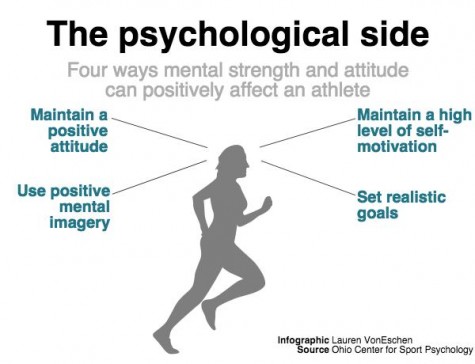Athletes train to grow mentally
Sports psychology works to improve motivation, success
March 22, 2016
Junior Meili Liss and the rest of the varsity girl’s soccer team worked with a sports psychologist during the summer of last season. She said the experience helped her to better understand the mental side of playing a sport.
Justin Anderson, a sports psychologist at the University of Minnesota, said a sport that a student plays often sits quite high on their commitment scale. But with challenging sports comes the possibility of a difficult time for an athlete and sports psychologists work to help athletes through those times.
Anderson said he defines sports psychology as the scientific study of how and why athletes perform at the levels they do. He said the team at Premier Sports Psychology works to improve athletes’ mental game to help them succeed in their sport by increasing success rates and aiding focus or remedying the negative effects of a difficult time.
“There are many skills that sports psychology can help with, such as confidence, focus and mindfulness,” Anderson said. “All of these skills are aspects of the mental game that affect performance.”
Varsity girls’ soccer player junior Meili Liss said the team worked with a sports psychologist last season. Liss said the time she spent with the psychologist helped her improve as an athlete.
“(The sports psychologist) helped me break down the mental part of soccer, which can be very confusing and frustrating at times,” Liss said.
Experiencing a difficult sporting season, month or game inevitably occurs for an athlete, according to Anderson. However, he said a sports psychologist helps lessen the negative effects of those challenging times.
“It is important for athletes to maintain a positive attitude,” Anderson said. “Try to find new ways to love what you’re doing such as exploring other skills you could develop both mentally and physically.”
Benjy Kent, the girls’ varsity team coach said the experience of working with the sports psychologist helped him understand how to teach the psychological side of soccer.
“Most coaches would say that (the mental part) is the hardest component to really teach because it’s really different for every person”, Kent said. “Having the opportunity to look at that part (psychological) of the training is really a valuable component”.
As a long-time soccer player, Liss said she experienced a lot of what her sport has to offer, but working with the sports psychologist taught her more about the psychological side of what she’s loved doing for years.
“I learned how important the mental part of a sport can be when working to reach your goals,” Liss said. “If you aren’t thinking in a positive way toward reaching your goals, you won’t reach them.”
A sports psychologist works to learn more about athletes and help them improve their mental game, according to Anderson. He said the team at Premier Sports Psychology can help with anything from working to increase their success rates by improving mental stability to helping an athlete deal with a difficult time in their sporting career.


